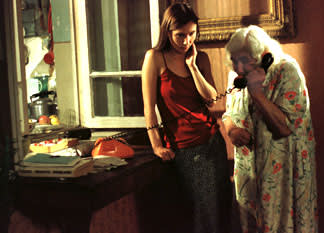Winner of the Grand Prize at Cannes (Critics' Week, 2003) as well as the César for best debut film (French Oscars) in 2003, Bertuccelli's intergenerational tale centre's on the lives of three women in post-Soviet Georgia. The film is as much a meditation on matriarchal perseverance as it is an ironic glimpse into the supposed rewards of migration in this case, the land of plenty is Paris.
Eka (played by the brilliant Esther Gorintin) is the energetic, if somewhat opinionated, 90-year-old mother to middle-aged and widowed Marina (Nino Khomassouridze). Marina's studious and solitary daughter Ada (Dinara Droukarova) is doted on by both women, though she shares a particularly intimate bond with her grandmother in their collective love for French literature and language. Both find France anchoring as a vestige of the odd connection it bears to Georgians (many studied and travelled there) and importantly, as the place where Eka's son Otar is presently living and working. Despite the obvious economic limitations, water shortages and electricity cuts that characterise their lives in Tbilisi, Otar's letters home allow for escape and cosmopolitan sophistication.
When news of Otar's death arrives, Marina's grief is replaced by the greater sense of anxiety that her aged mother will not survive the tragedy. Marina enlists Ada to start writing the letters instead, a decision that lends further pathos to the émigré tale. What Ada imagines Otar might have written is no doubt a reality she partially wishes for herself. France is galvanised when Eka decides to sell their book collection and insists they all head to Paris to pay Otar a visit, a journey that culminates in a cathartic shift for all three women.
Bertucelli's characters experience Paris as a cool, rainy city emptied of all its poetic significance, especially when Eka seeks out Otar in the working class tenements where he used to live. Juxtaposed against the economically uncertain yet architecturally beautiful city of Tbilisi, Paris is drab and faceless. Both a film focusing on the strength of women and the political reality that has led to the absence of men (Marina's husband died in a war; Otar had to migrate to support his family), Bertucelli's debut feature film is a powerful and promising start for the young filmmaker. (Mongrel Media)
Eka (played by the brilliant Esther Gorintin) is the energetic, if somewhat opinionated, 90-year-old mother to middle-aged and widowed Marina (Nino Khomassouridze). Marina's studious and solitary daughter Ada (Dinara Droukarova) is doted on by both women, though she shares a particularly intimate bond with her grandmother in their collective love for French literature and language. Both find France anchoring as a vestige of the odd connection it bears to Georgians (many studied and travelled there) and importantly, as the place where Eka's son Otar is presently living and working. Despite the obvious economic limitations, water shortages and electricity cuts that characterise their lives in Tbilisi, Otar's letters home allow for escape and cosmopolitan sophistication.
When news of Otar's death arrives, Marina's grief is replaced by the greater sense of anxiety that her aged mother will not survive the tragedy. Marina enlists Ada to start writing the letters instead, a decision that lends further pathos to the émigré tale. What Ada imagines Otar might have written is no doubt a reality she partially wishes for herself. France is galvanised when Eka decides to sell their book collection and insists they all head to Paris to pay Otar a visit, a journey that culminates in a cathartic shift for all three women.
Bertucelli's characters experience Paris as a cool, rainy city emptied of all its poetic significance, especially when Eka seeks out Otar in the working class tenements where he used to live. Juxtaposed against the economically uncertain yet architecturally beautiful city of Tbilisi, Paris is drab and faceless. Both a film focusing on the strength of women and the political reality that has led to the absence of men (Marina's husband died in a war; Otar had to migrate to support his family), Bertucelli's debut feature film is a powerful and promising start for the young filmmaker. (Mongrel Media)




